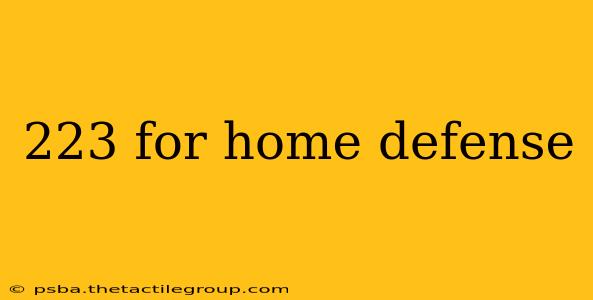The .223 Remington, a popular cartridge for sporting rifles and hunting varmints, has also become a subject of considerable debate regarding its suitability for home defense. This guide will explore the pros and cons of using a .223 for home defense, helping you make an informed decision based on your specific needs and circumstances.
Understanding the .223 Cartridge
The .223 Remington is a relatively small-caliber round, known for its flat trajectory and manageable recoil. Its lightweight nature allows for quicker follow-up shots, a crucial factor in close-quarters combat scenarios. However, its relatively lower stopping power compared to larger calibers like .45 ACP or 12-gauge shotgun rounds is a primary concern for some.
Advantages of Using .223 for Home Defense:
- Penetration: While over-penetration is a concern with any round, properly chosen .223 ammunition with appropriate bullet weights and designs can offer adequate penetration to neutralize a threat without excessive risk of passing through walls and harming innocent bystanders. However, understanding the potential for over-penetration and taking appropriate precautions is essential.
- Accuracy and Control: The .223’s flat trajectory and manageable recoil contribute to better accuracy, especially in stressful situations. This is critical for ensuring precise shot placement, maximizing effectiveness and minimizing collateral damage.
- Ammunition Availability: .223 ammunition is widely available and relatively affordable compared to some other calibers, making it a practical choice for regular practice and maintaining a readily accessible supply.
- Lightweight and Maneuverable: The smaller size and lighter weight of a .223 rifle, compared to a shotgun or larger caliber pistol, contributes to easier handling and maneuverability within confined spaces.
Disadvantages of Using .223 for Home Defense:
- Stopping Power: The .223's lower stopping power compared to larger calibers is its biggest drawback. While capable of incapacitating a threat, it may require multiple hits to achieve the desired effect. This is especially important in high-stress, life-or-death scenarios.
- Over-Penetration: The risk of over-penetration is a significant concern. A round passing through a target and into adjacent rooms could pose a serious risk to family members or neighbors.
- Barrier Penetration: The performance of a .223 round can be significantly affected by barriers such as drywall, wood, and glass. This needs to be considered and factored into your training and home defense strategy.
Choosing the Right Ammunition
The choice of ammunition is crucial when considering .223 for home defense. Avoid full metal jacket (FMJ) rounds due to their high risk of over-penetration. Instead, consider:
- Expanding Ammunition: These rounds are designed to expand upon impact, increasing stopping power and reducing penetration. However, expansion reliability can vary depending on the manufacturer and the type of barrier encountered.
- Controlled-Penetration Ammunition: These rounds are specifically designed to balance stopping power with reduced over-penetration. They aim to limit the risk of passing through walls.
Training and Responsible Gun Ownership
Regardless of the caliber you choose for home defense, proper training is paramount. Regular practice with your chosen firearm, including drills that simulate realistic home invasion scenarios, is crucial for developing the skills and reflexes needed to respond effectively in a crisis. Furthermore, always prioritize safe gun handling, storage, and responsible gun ownership practices.
Conclusion
The .223 Remington can be an effective round for home defense, but it's essential to understand its limitations and choose appropriate ammunition. Careful consideration of factors like stopping power, penetration, and ammunition availability is critical. Ultimately, the best choice depends on your individual circumstances, training, and understanding of the potential risks and benefits. Remember, responsible gun ownership includes thorough training and a deep understanding of your chosen firearm and ammunition. Consult with experienced firearms instructors and experts to ensure you're making the best decision for your safety and the safety of your family.

